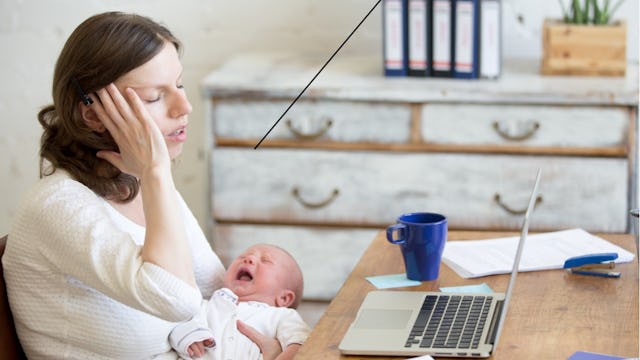Pregnancy-Related Migraines Are Real, And They Are Awful

I have been a migraine sufferer since my early 20s, when I started getting migraines with aura. I seriously thought I was having a stroke at first because the aura phase of a migraine is freaking terrifying. Eventually I calmed down, was diagnosed with migraines, given an otherwise clean bill of health, and learned to deal with the relatively mild migraine-related pain.
And then I got knocked up.
Holy shit on a shingle, my migraines during pregnancy took on a life of their own. During the first trimester, I got them almost weekly, and they were accompanied by new symptoms like extreme dizziness, light sensitivity, and much more pain than I had previously experienced. My midwife chalked the whole thing up to hormones (because, of course!) and told me to drink extra water, stay out of the heat, and hold on tight for the second trimester when everything would get better.
She was right: The second trimester was better for everything, including migraines. The rest of my pregnancy was mostly migraine-free, though they came back with a vengeance by the end of the third trimester when everything about pregnancy starts to totally suck balls again anyway.
Then, after my baby was born — just when I thought I was finally free from the discomforts of pregnancy — I started to get weekly (and sometimes daily!) migraines again. As if the hormone shifts, postpartum cramps, sleepless nights, self-doubt, sore nipples, and screaming baby weren’t enough to send me over the edge, I had migraines to add to the list.
It freaking sucked.
As it turns out, I’m not the only one who has experienced a spike in migraines in pregnancy and during the postpartum period, though at the time I sure thought I was the only one going through that level of hell. Yep, those pesky hormones during pregnancy and postpartum mess with us women in pretty profound ways. Ummm, thanks a lot, Mother Nature?
According to Dawn A. Marcus, MD, and Philip A. Bain, MD, authors of The Woman’s Migraine Toolkit, women who are already prone to migraines often see a sharp rise in them during pregnancy and the postpartum period. This is largely due to dramatic shifts in the hormone estrogen, say the doctors, who explain that low levels of estrogen often bring on migraines in women, whereas high levels of estrogen protect women from migraine symptoms.
In a excerpt from their book, posted on Migraine.com, Marcus and Bain describe how the fluctuations of estrogen during pregnancy exacerbate migraines for many women. The doctors explain that estrogen levels are low during your first trimester, but then rise during the second and third trimesters, which is why you are more prone to migraines during your first trimester and less so during your second and third trimester.
“Many women find that headaches improve as estrogen levels surge during pregnancy,” explain the doctors. “Improvement usually begins at the end of the first trimester. This tends to continue throughout the remainder of pregnancy, while estrogen levels stay high.”
Marcus and Bain say that as many as 60–70% of migraine sufferers actually may see “significant improvement” in their migraines during the second and third trimesters of pregnancy. So I guess there is a silver lining here after all? Sort of?
But hang tight, because things go totally haywire after the baby is born, when the authors say migraines become more prevalent again. “When the baby is born, estrogen levels drop and headache protection is lost, causing headaches to begin again,” write Marcus and Bain.
These doctors basically describe my experience to a T, and I’d be willing to bet that a lot of my migraine sisters experienced a similar pattern. Of course, not all women will experience it this way, especially since migraines have a lot of causes, and not all of them are hormonal. In fact, I would say that most of my migraines are brought on by a perfect storm of several triggers at once, usually with a hormone fluctuation thrown in for good measure.
The good news here (and I promise there is some!) is that while Marcus and Bain say that migraine sufferers seem to see a spike in migraines in the first 1–4 weeks following birth, things usually go back to their pre-pregnancy level after that, at least in terms of migraine-triggering hormones. So there is definitely hope out there for the women who find pregnancy and postpartum to be a real bitch when it comes to migraines.
But truth be told, parenthood in general can exacerbate migraines for lots of women out there. Just the stress of having kids and not being able to eat well, sleep well, or practice proper self-care can do a real number on women who are prone to migraines.
Sigh…
But one day our kids will be all grown up, we’ll sleep again, eat well again, exercise, meditate…and then be slammed with menopause, which I’ve heard is a total fuck-you when it comes to hormones and migraines.
This article was originally published on